What 5 episodes of 'Recess' were really about
Published on April 1 2012
When I was younger I watched every episode of Recess (an American animated series set in a strange if not overly familiar school playground) with such frequency that each could have been a ten-minute season in of themselves. And yet the reason I still watch one or two/a few/all of them on occasion is because, as an 'adult', I've become aware to their inherent genius.
In another life the show's creators Paul Germain and Joe Ansolabehere would have been some of the world's greatest sociologists, but in this Universe they chose to use their brilliant understanding of human behaviour and society and use it to subliminally project freethinking ideas to children everywhere.
Now the two are probably just as, if not more, well known for creating Rugrats, but I personally think Recess was the smarter show. The way it built an entire society within a school playground, complete with economy, social hierarchy and, of course, a monarchy is something I very much intend to write a book on one day.
Five episodes in particular struck me out as particlarly profound for the real messages hidden behind their goofy child antics. They are, in no particular order, listed below:
Economics of Recess
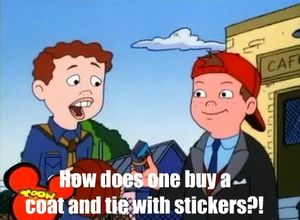
The plot: When T.J. returns after an extended absence from school, he finds that a new sticker craze has become the playground's new currency.
What it's really about: Capitalism
Here's why: So we've probably all, at some point in our school careers, had some collectible dominate the playground. This episode stretches it to an extreme cautionary tale of how dangerous economic prosperity can be to an individual and society on a micro scale.
As balls are auctioned off and the school's number one teacher's tool is up to his neck in friends after becoming rich through inheritance, T.J. finds himself without a sticker to his name.
The episode marks his progression from working stiff, to business savvy entrepreneur and finally to an all powerful magnate, ultimately crippled by the economy he helped to expand.
Every secondary character represents some unwanted facet of economic liberalism; Menlo ultimately becomes as poor as T.J. was after he throws stickers left and right, whilst Randall and his aforementioned sale of dodgeballs becomes a small business reduced to nothing by a money hungry tycoon.
But of course T.J. is our episode's simultaneous protagonist and threat. When he begins earning his own stickers he ignores the requests of his friends (who represent the well off middle class) to go play, which was the very thing he lamented not being able to do, and when he finds the amount of stickers he's earning isn't sufficient he works out a way to exploit workers and trick customers.
His wealth becomes so vast that the rich and poor divide is literally between him and everyone else. Having bankrupted the economy, it is forced to change its exchange base to another brand of stickers; highlighting that what makes you valuable is only valuable until you're the only one who owns it.
The episode's final scene, in which T.J. is forced to sign a contract forbidding him from securing so much capital ever again, argues that inflation is not something that just 'happens'. T.J. sold his hat for 5 stickers, he bought it back for 1. He controlled the prices, the market and, near the end, the products themselvs.
If anyone knows of a good study where kids at a playground are given a collectible and observed on how they trade and exchange it, who becomes rich and how, then please let me know. If there isn't one, are any psychology/business students foaming at the mouth right now?
Swing on Thru to the Other Side
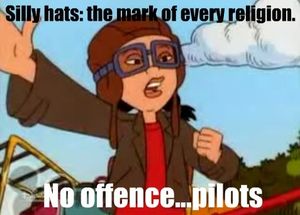
The plot: After Spinelli thinks she sees the 'swinger-girl' swing over the bar and into another plane of existence, she organizes a movement to worship and, eventually, join her.
What it's really about: Religion
Here's why: I actually had to do a double take on this one when I really thought about it, given the country of origin and the company that produced it.
Spinelli's actions bear all the markers of a pseudo-religious cult; an impossible event of supernatural description, unverified eye witness accounts, defiance of the laws of science and absolute faith and conviction in one's position irrespective of logic and rational thinking.
Just like the previous episode, every character serves a purpose. Spinelli herself is the enigmatic preacher, changing her previous violent demeanour to an overly peaceful and caring tone when she becomes a 'born again swinger'. Mikey is the sheep; the easily converted and susceptible to wondrous and superstitious claims peddled by a confident authority figure. Every other kid in the playground is sold by the social inclusion, the miniscule possibiity that it might be true...and the free hats.
Some scenes exclusively seemed aimed at particular religious myths. I'm sure even the most hardened nay sayer against what I'm typing will raise an eyebrow when Spinelli tries to 're-recreate Swingergirl's lunch' last supper style, the way all the children line up to touch the holy relic that is the swing and Mikey's chanting in the opening scene to make him a better basketball player. If you don't feel these are undeniably an attack on such idiocy then wait till they form circles and, well, pray.
At the end the myth is expelled; Swingergirl returns, Spinelli is proved wrong, life continues. I feel this is a sour note, as in reality most of the world's most popular religions continue to indoctrinate despite being totally disproved, and even then the preachers don't abandon their faith - they attempt to bend and distort reality to fit their archaic view. They become apologists, or suffer serious psychological damage.
I don't feel that those who are convinced in theistic beliefs are liars. I feel they genuinely invest themselves in what they believe, but its when they ignore the overwhelming evidence to the contrary then they are being dishonest. The episode's final scene does touch on the fact that even Christianity and Islam have some nice things to say, but the words of people are separate to the untrue supernatural claims they accompany.
The Rules
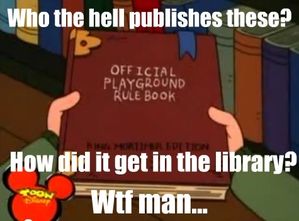
The plot: A playground rule book written by the revered 'King Morty' is found, but when they are reinstated they conflict with the modern playground's ideologies.
What it's really about: Anarchism
Here's why: There are actually a few issues underlying this particularly brilliant episode, not limited to but including modernity, totalitarianism and anti-theocracy, but this one sticks out the most for me. It's a big subject and I've read far too little to be totally correct, but I hope you'll give me legroom.
When the rules are put into effect, there is excitement from the older and younger kids simply due to the fact they were written by a ruler who, it is assumed, actually accomplished something in his time. It's only when they are actually put into practice, and kids find themselves washing rags, playing with stumps and being taken to 'the cabbage field' do they piece together that this way of doing recess was pertinent only to the time the rules were laid down, namely during The Great Depression. By then of course it's too late, as King Bob''s two advisors, now nicknamed 'The Fun Police' and charged with enforcing the rules have absolute power.
The depiction of a society in which the rules themselves carry such esteem, irrespective of their actual application to moral or social functions, is truly fascinating, but more so that they are forced upon the children after they're proven to be outdated. Again, I had to clean out my ears when more Big Brother styled security are brought out and called 'The Secret Fun Police'.
When T.J. and his lot have had enough of living under an archaic set of commands, they find an area free of the Big Brother styled 'fun police' and just play the way that makes sense to them. This is the key part of the episode for me, where simply playing kickball (with a ball) is considered illegal even though it was what they were doing mere hours ago. I have varying opinions of what should be legalised and what shouldn't, but I do feel many of the negative perceptions we have to things such as drugs, prostitution and gambling come because of whether or not they are forbidden.
Now some have said this episode is an outright attack on the bible and other holy texts. That certainly is hard to argue against when King Bob says:
"Morty's rules are old, therefore, they are wise"
to which Swinger girl replies:
"Makes sense to me!"
But I see this extending to any rules written long ago by an authority figure, whether they be the Q'uaran or the constitution. The latter for example, which I don't profess to know at all, may have been a remarkable document written by true geniuses, but its right 'to bear arms' didn't include uzis, and now its author's ideas of free speech and separation of church and state are being distorted, and they're not there to defend them.
Unlike the previous two episodes this one isn't an outright criticism of rules, leadership and the state. In the final scene, the old rules are reinstated, and its decreed they will be continually modified until they work best. If this episode isn't an arguement against conservatism then I don't know what is. It does make me wonder why there was never an episode about the kindergarteners seeking a referendum for independence on the playground though...
The Story of Whomps
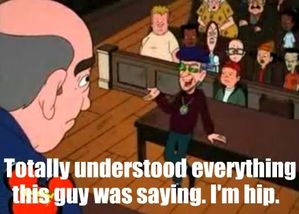
The plot: T.J. gets in trouble when his word 'whomps' is branded a swear word.
What it's really about: Freedom of Speech
Here's why: Let's keep it going with the liberalism. This is also the first episode on my list to actually bring adults into this. Oh yeah, they actually go to a school in this show...
As someone who wants a career in radio yet also can't abide with our no swearing culture, I thoroughly enjoy this episode. Well, that and for the Pulp Fiction reference.
Unlike the others I'm going to start from the end, with the Super Intendent's line that no one can control what goes on in someone's mind. How do we denote a word to be 'vile', or even just 'bad'? The majority of words we consider taboo in western society generally accompany bodily functions that are themselves taboo. Ignoring why we can't talk about poo, T.J.'s word carries no meaning.
The only reason the word becomes out of bounds is because the teacher's declare it so. After that it's usage increases hugely and it becomes a real issue; a great demonstration on how criminalizing something makes it more desirable.
But sticking to one topic, the perfect progression of how a simple act of free speech can be mislabelled as swearing in a single day is just beautiful. When the word becomes banned, T.J. encourages its usage to the point where it carries so many meanings a dictionary entry for the word would take up an entire page.
Look at so many of our worst words and how their meaning has changed. Nigger was first a racial slur, now it's gained some acceptance in intergroup usage. Gay was originally used to describe the 'carefree' or 'happy', but by the 19th century it was already describing homosexuals, and in playgrounds its used an insult with varying reference to...well, gays.
The point is the word is harmless. Like any weapon it only serves the purpose given by the user. Calling someone a faggot is no different to calling them a degenerate. You could be shouting gibberish and the tone and volume of your voice would still carry the meaning. To insult is to insult. Hate the player not the game.
The Fifth and Sixth Graders Club
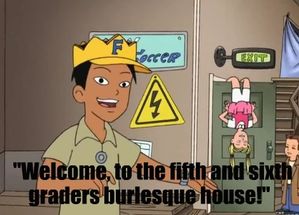
The plot: T.J. and pals are invited to an exclusive playground club, but forbidden to speak of it to the younger years.
What it's really about: Social elitism
Here's why: So this is my curveball final choice. If you grew up with Recess you may not even have seen this episode; it came as part of a three part TV special that followed the theatrical film. Now everyone has reached the next year, and whilst the episode features largely recast voice actors (including T.J...) it's actually rather enjoyable, with the same explorative writing and humour.
In this second part, the gang are invited to the lucrative 'fifth and sixth graders club', kept secret from them until now. Though at first overjoyed at the invitation, they show hesitation when they realize all their old rivals and assholes are members too. This disapears soon however, as all those who were extended a membership feel such esteem that they also have mutual respect for other members.
Unfortunately this playground country club doesn't hold much respect for non-members. In fact, Gus and Mikey, who enjoy the new found attention and respect they previously were denied, out right dismiss and insult their younger peers, including the former kindergarteners who look up to them.
In one instance the big guy refers to the club as a 'utopian experiment in niceness and equality'. Well yes, but only to those within the club. Dividing yourself from a sect of society may bring you repsect from the division, but you're still divided.
As the group get involved in hot tup parties, racket ball games and a steam room (yeah...who's funding this club house exactly?) there's no denying they are the social upper-class. I do like how Lawson says he's worked to be a 'big kid' all his life, and though T.J's explanation of the moral is very heavy handed, it still makes the case that hanging out with those who accept you makes you lose track of those they don't. I mean the Ashleys were in this club; the living embodiment of snobbery.
Speaking of which, some may argue that the episode 'The Ratings Game' would be more appropriate for this topic, but I think that episode largely speaks for itself, and I like to dig deeper.
Whether they’re for feedback or discussion, comments are always appreciated!
Find out when The Urban Shepherd goes on his next diatribe by following him on Twitter!

/image%2F1180668%2F20160229%2Fob_6d2086_urbanshep.png)
/image%2F1180668%2F20160229%2Fob_f99b04_the-urban-shepherd-banner-resize.jpg)